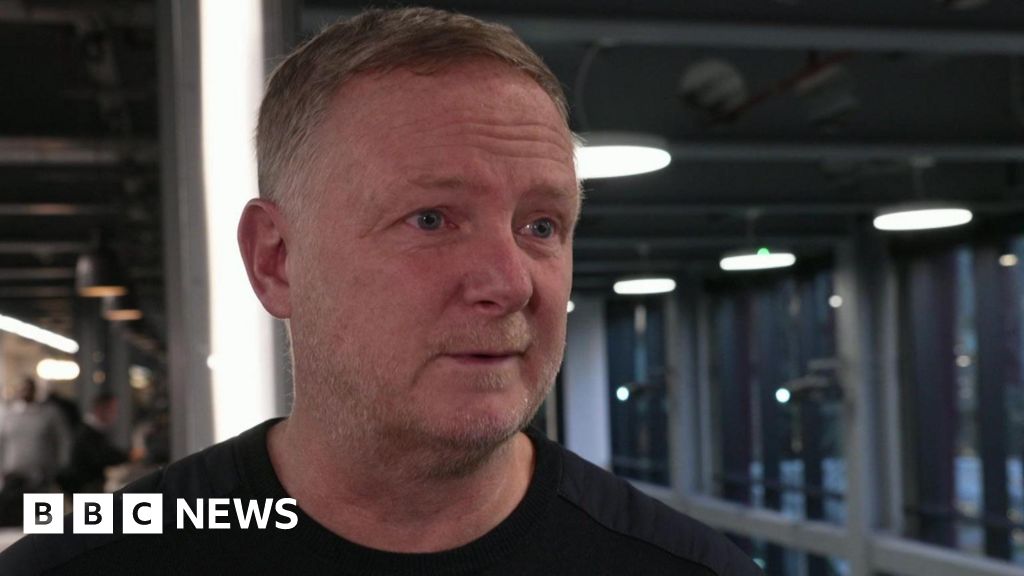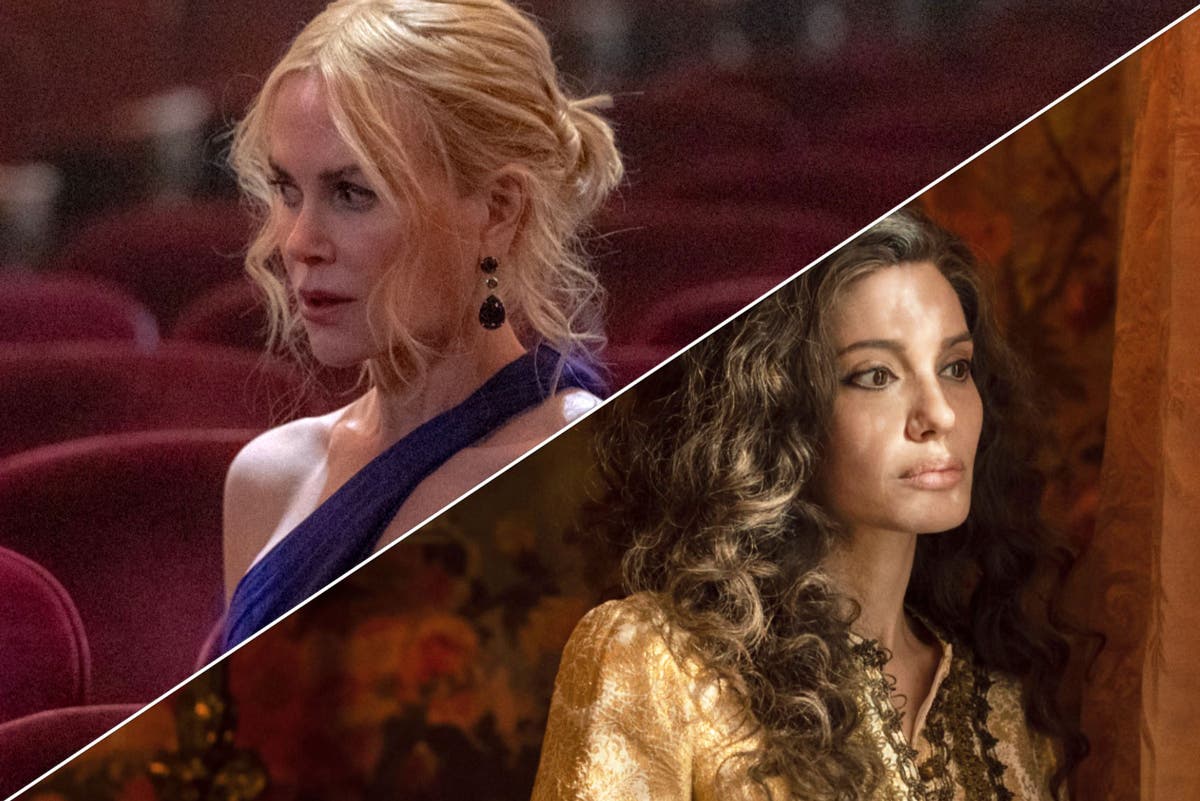The film year opens with a jostle of egos, a rustle of couture and the sight of two old acquaintances vying for Oscar glory, metaphorically throwing bricks at each other across the garden wall. On one side we have Angelina Jolie acting the diva in Maria, Pablo Larrain’s elegiac account of the last days of opera singer Callas. On the other, there’s Nicole Kidman as the eponymous Babygirl, a high-flying executive who’s brought down to earth with a bang. Both films are stylish, confident and generally satisfying affairs. Both, though, are predominantly support systems; showcases. They exist to provide a stage or springboard for their respective headline acts.
Maria is the more lavish and stately production. The final part of Larrain’s loose trilogy of tales about wealthy, wounded women – following 2016’s Jackie and 2021’s Spencer – picks its way through an autumnal 1970s Paris, from the apartment to the bistro to the Jardins du Luxembourg. It has a liveried butler in close attendance and trails an air of melancholia that’s as thick as posh cologne.
Officially, 49-year-old Jolie is playing 53-year-old Callas, the Greek-born soprano, four years retired and contemplating a comeback. But she is also implicitly referencing herself: one legend nodding to another to the point where the actor and her character become almost indivisible. Larrain is a dynamic and distinctive filmmaker, but here he doesn’t so much direct Jolie as administer to her needs. He handles his star as though she’s a porcelain swan, lightly steering her from one set-piece to the next as Callas pops her heart pills and browbeats her servants. “Book me a table at a restaurant where the waiters know who I am,” she demands. “I am in the mood for adulation.” Larrain, for his part, is all too happy to oblige.
Where Maria goes about its duties like a doting butler, Babygirl bustles in as a personal trainer. The film puts Kidman through her paces and makes her work up such a sweat that one occasionally fears she might crack. Written and directed by the Dutch-born Halina Reijn, the film is an Eighties-style erotic thriller upgraded with a knowing female gaze and a more playful, elastic sense of what constitutes exploitation and abuse.
Kidman (57 last birthday and playing roughly her age) leads the charge as Romy Mathis, the glossy CEO of a New York-based robotics business, who embarks on a perilous affair with her swaggering young office intern (nicely played by Harris Dickinson). She’s ambushing him in the gents to the sounds of INXS’s “Never Tear Us Apart”. She’s lapping milk from a saucer to the strains of George Michael’s “Father Figure”. Many of Kidman’s scenes risk being silly, which is partly the point. Off-camera, the actor has confessed to feeling “exposed, vulnerable and frightened” by the prospect of the film’s release. On screen, it is these very qualities that make the character of Romy so compelling.
Films like Maria and Babygirl are typically billed as star vehicles. But I’ve always thought that they’re more akin to houses than cars: a basic structure that an actor can live and work inside to the point where the film feels like a natural extension of their screen image and interests. The deeds tell us that Babygirl is a Kidman property and Maria belongs to Jolie, but the roles themselves are interchangeable. It’s not hard to imagine a pair of parallel movies in which Kidman is haughtily chastising her servants while Jolie goes rogue and jumps a young stud in the john.
Not so long ago that’s where the smart money would have been: on an alternative history, starting in the early 2000s, in which each actor tackled the other’s career. Jolie’s volatile early roles (in Girl, Interrupted, say, or Gia) set a direction of travel that might have propelled her very nicely through Dogville and The Paperboy, Stoker and The Northman. The more mainstream, conservative-looking Kidman, meanwhile, seemed perfectly suited for The Tourist, Maleficent and Marvel’s Eternals, with a stately sideline as a UN special envoy. One star was geared for trouble and risk, the other for comfort and the well-appointed grand stage. Except it turned out we had these rivals muddled up. The actors tore up the script and confounded our expectations. The two women switched courses and effectively swapped addresses.

“I have this very spontaneous, non-strategic side,” Kidman once explained. “Which is why I have had such a winding career.” It is a quality that has served her well down the years. In Babygirl – but also in Birth, Big Little Lies, and any number of others – one has the thrilling sense of Kidman leaning into her own vulnerabilities, shedding her dignity, daring to look foolish. Compare that to Jolie, whose career has become one of safety-first brand management; a sombre repudiation of her sparky old public image. She’d baulk at playing transgressive Romy Mathis, a middle-aged heroine who’s just as explosive in her way as Amy Adams’s lycanthrope in Nightbitch or monstrous Demi Moore in Coralie Fargeat’s The Substance. Instead, she’s more secure in the role of the rigid, poignant Callas, arranging herself by the window in her puff sleeves and pearl chokers.
While Babygirl and Maria are both released in the UK this week, the movies have been in lockstep since they both premiered in competition at last year’s Venice film festival, typically the first leg of the race towards the Oscars. Maria is the solid film, the safer bet. Babygirl, though, showcases a far better performance. Its manifestation of fiftysomething female angst looks to the future – not the past. It flickers with unease and sometimes outright terror, and rushes headlong at situations Jolie is at pains to avoid. Against the odds and expectations, it is Kidman who has built the more vibrant, exciting career. The pictures themselves may be joined at the hip. As for the stars, they have long since diverged: these days they barely occupy the same postcode.
‘Maria’ and ‘Babygirl’ are in cinemas from 10 January



